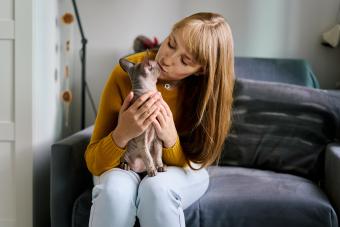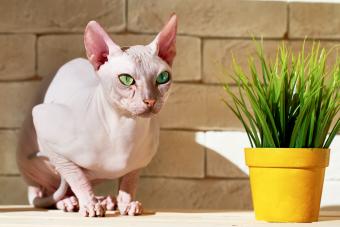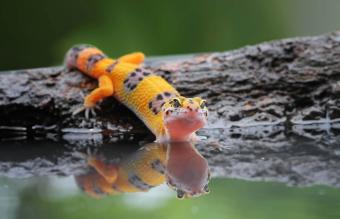
If you live with pet allergies, you know how agonizing it is to not be able to share your life with animals. Most people who are allergic have reactions to dogs or cats, but a few breeds are actually less likely to trigger your symptoms. And if you pick a pet on the feathered or scaly side, we have good news. Whether you're searching for a furry companion or sometime a little less cuddly, there's a pet for you.
1. Poodles

Just because you have allergies doesn't mean you can't have a dog. Poodles, whether standard, miniature, or toy-sized, are known for their curly, hypoallergenic coats. These coats retain dander, reducing the allergens in the environment. Their intelligence and friendly demeanor are next-level, too!
Mixed-breed dogs that include Poodles in their lineage - like the goldendoodle - are also generally considered hypoallergenic.
2. Bichon Frise

Bichons Frises have soft and silky undercoats with a curly outer coat that minimizes dander. Theyre super smart like Poodles, but Bichons tend to be a bit more people-oriented. They're friendly, playful, and great with kids and adults alike.
The curly, fluffy coat of the Bichon Frise is similar to a Poodle's in texture. It retains dander like the Poodle's does, too!
3. Schnauzer

Schnauzers make great pets for people with allergies due to their distinctive double coat, which sheds less than many other breeds. The dense and wiry outer coat is supported by a softer undercoat.
Minimal shedding helps keep allergens like dander, a common cause of allergic reactions, from being released into the environment. It's not 100% guaranteed to fix your allergy problems, so make sure you've spent time with each of these breeds to see how sensitive you are before making a decision.
4. Sphynx

Sphynx cats are highly recognizable for their hairless bodies, and they can be a great option for people with allergies. The lack of fur significantly reduces the amount of allergens they release into the environment, as most allergens are typically found in a cat's dander and fur.
The Sphynx still produces the allergenic protein Fel d-1 in their saliva and skin oils, so regular cleaning is necessary to keep allergens to a minimum.
5. Russian Blue Cat

Russian Blue cats are often considered to be a good choice for people living with allergies because of their unique coat properties and their lower levels of the Fel d-1 protein. The double coat of Russian Blues is dense and plush, which traps dander and dead hairs and prevents them from becoming airborne, where they could trigger an allergic reaction.
Russian Blues are known for grooming themselves more frequently than other cats.
6. Siberian Cats

Despite having a thick and lush triple coat, this breed tends to spread fewer allergens around. Regular grooming can help manage the dander and keep shedding to a minimum, further controlling allergen distribution.
The Fel d-1 allergen is mutated in the Siberian cat resulting in pet owners experiencing fewer allergic reactions.
7. Hairless Guinea Pigs

Hairless guinea pigs, also known as skinny pigs, can be a great choice for people with allergies. These unique Guinea pigs lack the usual fur coat seen in most breeds, which means they don't shed hair and produce less dander, the primary allergens that cause reactions in people sensitive to pets.
However, skinny pigs do still produce allergenic proteins in their urine and saliva, which can cause allergic reactions in some individuals. Reactions to Guinea pigs are somewhat less common overall, however, so they may be a good option for you.
Although skinny pigs don't need to be brushed, their skin does require special care.
8. Hairless Rats

Hairless rats are another small mammal pet that lacks fur, which reduces the amount of dander they can shed into the environment. Pet hair can be a significant trigger for allergies in sensitive individuals. However, they still produce allergenic proteins in their urine and saliva, which could cause an allergic reaction.
It's all about your individual reaction, so be sure to spend a little time around any pet you're considering. And make sure you do it away from a pet store or location where there are other types of pets around. You need to be in an environment where the only animal that could trigger your allergy is the one you're considering for your home.
Get out the baby oil. These rats need to be lathered daily to maintain their skin health and overall well-being.
9. Hermit Crabs

These crustaceans are fun, low-maintenance, and hypoallergenic for most people. They don't produce the same kind of allergenic proteins found in many mammalian pets. They need a specific type of habitat - and no, they aren't as cuddly - but they make a great option if you're extemely sensitive to pets with fur and you don't want a reptile or bird.
People with shellfish allergies might react to hermit crabs, so it's important to consider this when looking for your new pet.
10. African Dwarf Frog

Like fish and reptiles, frogs do not produce dander, making them a safe bet for allergy sufferers. The African dwarf frog is a popular choice. They are entirely aquatic and live submerged in water, which further minimizes the potential for spreading allergens.
These frogs require a properly maintained aquatic habitat with clean water and the right temperature to thrive.
11. Axolotl

Since axolotls are aquatic salamanders, they don't produce the common airborne allergens associated with fur or feathers, reducing the risk of triggering an allergic reaction.
Even though they are generally low-maintenance, axolotls do require specific care, like a carnivorous diet and a tank free of rough objects that can harm their soft bodies.
The Axolotl is so fascinating in their ability to regenerate organs, tissues, and the central nervous system, they have been used in research for more than 200 years.
12. Pionus Parrot

Although no bird is truly hypoallergenic, some people with allergies have found they tolerate Pionus parrots better than other species. These birds produce less powder down - a type of feather that produces a dust which can trigger allergies - than other types of parrots.
Pionus Parrots have an oil gland rather than a powder gland. The powder gland is what is responsible for allergies.
13. Ring-Necked Dove

Ring-necked doves also produce less powder down. The powder down, used by birds for preening, can become airborne. This is what triggers most bird allergies. These doves are known for their calm demeanor, gentle cooing, and are typically easy to care for, making them a delightful addition to the family.
Ring-necked doves need more attention and socialization than other bird species and it's recommended you have a pair.
Sign up for our newsletter featuring all the latest stories and products we love.
14. Canary

Canaries are relatively easy to care for and sing beautiful songs making them a popular choice among bird lovers. Not only do they produce less powder down, they're also smaller than other bird species, limiting the allergens in the air.
Canaries are independent, so if you don't have time for socialization, this could be the bird for you.
15. Bettas and Other Fish

Fish are great pets for people with allergies, as they don't produce any dander. A beautiful aquarium can be the centerpiece of the house and requires less interaction than other pets if you're looking at beginner fish species. Freshwater fish, like bettas and goldfish, are easy for beginners to care for.
Contrary to popular opinion, goldfish and betta fish should be kept in an aquarium rather than a fish bowl.
Best Hypoallergenic Pets for Children

If your child is the one who has allergies in the household, you may want to focus more on which animals are best suited for kids:
- Hairless Hamsters: Small mammals like the hairless Syrian hamster can be a good choice as they do not have fur that can trigger allergies. They are small, cute, and easy to care for, making them suitable pets for children.
- Bearded Dragon: Reptiles like beardies are calm, beginner-friendly species that will enjoy spending time with you and your family. And reptile allergies are fairly uncommon overall.
- Anole: Anoles can be great pets for kids that don't plan to socialize with their lizard frequently.
Don't let your kid get their heart set on anything yet. Allow your child to spend some time around each pet to find out if they're allergic first.
Best Hypoallergenic Pets for Apartments

The kind of pet you choose for your apartment depends on what you're looking for. Consider whether you're searching for a constant companion or an indepedent species that doesn't take as much committment.
- Shih Tzu: The Shih Tzu is a cute, small dog that's suitable for apartment life. You'll still need to walk them every day, but their hypoallergenic coat can be a huge relief for those with allergies.
- Devon Rex Cat: If you're more of a cat person, consider a Devon Rex. These playful, affectionate cats have short, curly fur that sheds less than that of most cats. They're known for their adorable faces and playful personalities.
- Leopard Gecko: Geckos are excellent pets for apartment dwellers with allergies. These animals don't produce allergenic dander. They are also quiet and don't require a lot of space.
- Fish: There's a wide variety of colorful species that are easy to care for, and the tank itself can also be a lovely addition to your apartment's decor. Just make sure aquariums are allowed first.
If you're renting, ask your landlord which pet types you are permitted to have before bringing one home.
What Makes a Pet Hypoallergenic?

Pets are considered hypoallergenic if their body produces fewer allergens than other animals. People are allergic to proteins found in the pet's dander, saliva, urine, or feathers. So, when we say a pet is hypoallergenic, we mean the pet's body makes fewer of these proteins, or that the proteins are less likely to become airborne where they can be inhaled.
No pet is completely non-allergenic, but hypoallergenic pets are less likely to produce a reaction.
Choosing a Hypoallergenic Pet

Even though no pet is guaranteed to never trigger your allergies, some are less likely to bother you than others. Do your research about the pet types you're considering to get to know their special needs. Also, make sure you spend time with a pet you are considering in a clean environment before getting one. Each pet requires special care and deserves a comfortable environment, too, so make sure you can meet their needs, just as you want them to meet yours.







